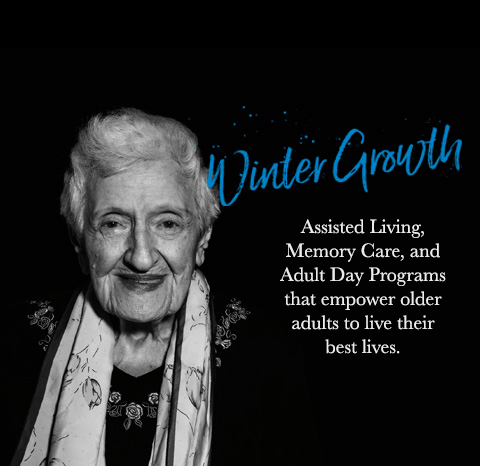
ADULT DAY, Memory Care, Assisted Living & Respite Care PROGRAMS
INDEPENDENCE. DIGNITY. LIFE SATISFACTION. In our Adult Day, Memory Care & Assisted Living, and Respite Care programs, days are filled with engaging activities, exercise, laughter, and friends.
We embrace and celebrate all that individuals are, and all they have the potential to be.
With over 45 years of experience providing support for seniors and adults with disabilities, we are proud to be known as the place where friendships grow and care is extraordinary.
SEE THE DIFFERENCE
Stop by for a visit or schedule a preview day. We’d love to meet you and show you around. You’ll quickly see why Winter Growth is the top choice for people searching for a place where their loved ones will feel at home and know they matter.
ADULT DAY, Memory Care, Assisted Living & Respite Care PROGRAMS
INDEPENDENCE. DIGNITY. LIFE SATISFACTION. In our Adult Day, Memory Care & Assisted Living, and Respite Care programs, days are filled with engaging activities, exercise, laughter, and friends.
We embrace and celebrate all that individuals are, and all they have the potential to be.
With over 45 years of experience providing support for seniors and adults with disabilities, we are proud to be known as the place where friendships grow and care is extraordinary.
SEE THE DIFFERENCE
Stop by for a visit or schedule a preview day. We’d love to meet you and show you around. You’ll quickly see why Winter Growth is the top choice for people searching for a place where their loved ones will feel at home and know they matter.
ADULT DAY, Memory Care, Assisted Living & Respite Care PROGRAMS
INDEPENDENCE. DIGNITY. LIFE SATISFACTION. In our Adult Day, Memory Care & Assisted Living, and Respite Care programs, days are filled with engaging activities, exercise, laughter, and friends.
We embrace and celebrate all that individuals are, and all they have the potential to be.
With over 45 years of experience providing support for seniors and adults with disabilities, we are proud to be known as the place where friendships grow and care is extraordinary.
SEE THE DIFFERENCE
Stop by for a visit or schedule a preview day. We’d love to meet you and show you around. You’ll quickly see why Winter Growth is the top choice for people searching for a place where their loved ones will feel at home and know they matter.

WE’RE A NONPROFIT
As a nonprofit, care is our driving mission. It also means that out our pricing is 15%-20% less than you will find at other Assisted Living and Memory Care communities offering similar services. There are no Entrance Fees, and our Cost-of-Care is all-inclusive – making planning for your loved one’s long-term needs easy and affordable.
OUR SMALL SIZE COMES WITH BIG BENEFITS
Unlike large, resort-like facilities, Winter Growth offers a more intimate setting that feels like home. This smaller setting provides several tangible benefits as well, including:

Providing services that are responsive to individual preferences, needs, and values.

Deeper opportunity for social connections and closer relationships with staff and others because residents see the same people every day.

Encouragement of independent mobility resulting from a one-story layout intentionally designed to be easy for all to navigate.

Low staff to resident ratios which make it possible for nursing team members to provide more time caring for each individual.

Easily control the spread of viruses and other illnesses while also helping residents stay stronger longer.

Meals prepared onsite and served in a manner reminiscent of gathering around the family table.
OUR SMALL SIZE COMES WITH BIG BENEFITS
Unlike large, resort-like facilities, Winter Growth offers a more intimate setting that feels like home. This smaller setting provides several tangible benefits as well, including:

Providing services that are responsive to individual preferences, needs, and values.

Deeper opportunity for social connections and closer relationships with staff and others because residents see the same people every day.

Encouragement of independent mobility resulting from a one-story layout intentionally designed to be easy for all to navigate.

Low staff to resident ratios which make it possible for nursing team members to provide more time caring for each individual.

Easily control the spread of viruses and other illnesses while also helping residents stay stronger longer.

Meals prepared onsite and served in a manner reminiscent of gathering around the family table.
YOU ARE OUR DRIVING MISSION
Winter Growth’s founder dreamed of creating a community where seniors and adults with disabilities could continue to learn and grow – where their lives would be filled with joy and purpose. Now, over 45 years later, we have an amazing community of clients, families, and staff.
OUR SERVICES
With communities located in Columbia and Olney, Maryland, Winter Growth offers Assisted Living and Memory Care that feel like home, a vibrant Adult Day Program, and both hourly and overnight Respite Care.
CAREGIVER RESOURCES
From a variety of support groups, to transportation, education and more, help is available to assist you in your caregiver journey.

Our vision is to make Winter Growth the leader in person-centered care.

Our vision is to make Winter Growth the leader in person-centered care.
CONTACT US
If you have questions or you’d like to schedule a visit, just use the form below and we’ll get back to you. Thanks!
© Winter Growth, Inc. 2019 | Privacy Policy
Winter Growth is a 501(c)(3), an Assisted Living Magazine Best in Senior Living designee, a SOBAR Certified Organization, a Montgomery County Dementia Friendly Business, a GuideStar Exchange Platinum Participant, a Howard County Original Business, a 2025 COGS Member, and a proud member of the Olney Chamber of Commerce.
Winter Growth as a recipient of federal financial assistance has a non-discrimination policy as required by Section 601 of Title VI of the Civil Rights Act of 1964, Section 504 of the Rehabilitation Act of 1973, and the Age Discrimination Act of 1975. Specifically, that policy states that no person will on the grounds of race, color, religion, age, sex, national origin, ancestry, or disability, be excluded from participation in, be denied benefits of, or otherwise be subjected to discrimination in the provision of any care, service, or employment. This institution is an equal opportunity provider and employer.
If you believe you have been subjected to unequal treatment because of race, color, or national origin, then you have a right to file a formal complaint.
Complaints may be filed within one hundred-eighty (180) days following the date of the alleged discriminatory action. Requests for more information or complaints may be submitted to Human Resources by mail (18110 Prince Philip Drive, Olney, MD 20832), telephone (410-964-9616), or email.
The USDA and MSDE are equal opportunity providers.










